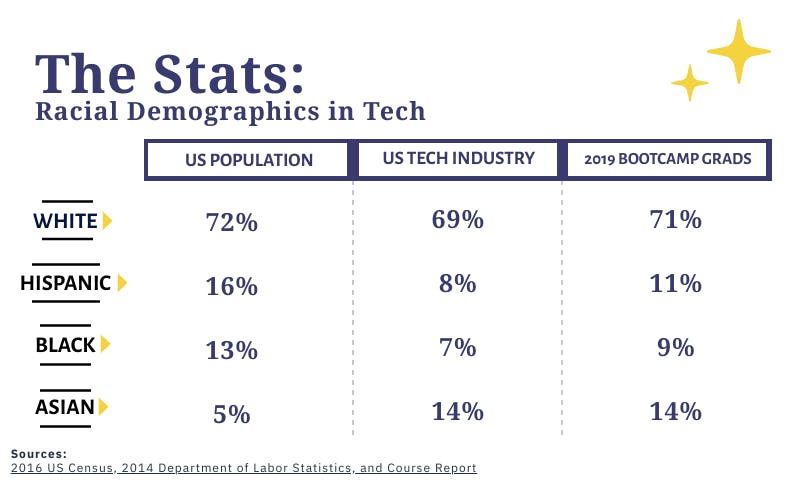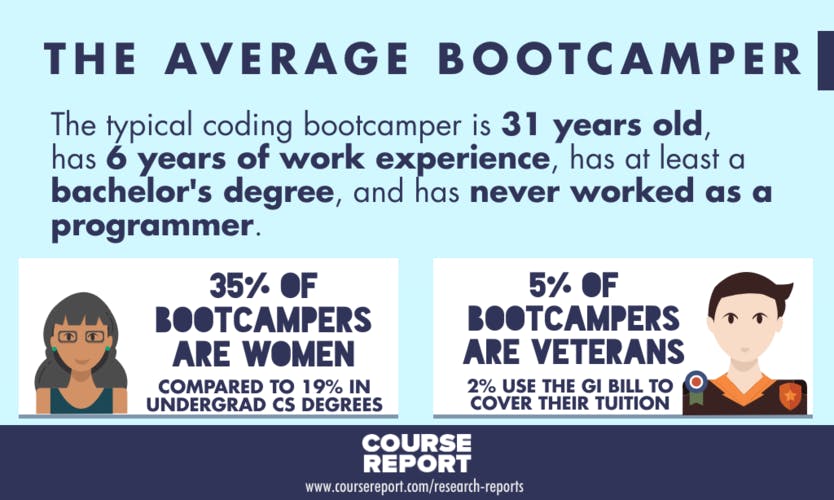Guide
How Coding Bootcamps Can Change the Face of Tech

![]()
Written By Lauren Stewart
![]()
Edited By Jess Feldman

![]()
Written By Lauren Stewart
![]()
Edited By Jess Feldman
Course Report strives to create the most trust-worthy content about coding bootcamps. Read more about Course Report’s Editorial Policy and How We Make Money.
Course Report strives to create the most trust-worthy content about coding bootcamps. Read more about Course Report’s Editorial Policy and How We Make Money.
Most high-salary industries need more diverse workers, and tech is no exception. The conversation about diversity in tech usually focuses on gender, diversity encompasses racial, socioeconomic, cognitive, and experiential differences. Think pieces and diversity reports show large tech companies admitting they have a problem and beginning to address the diversity in tech crisis, but can the industry really change? Even if companies make public commitments to hiring more diverse candidates for technical positions, is the pipeline strong enough to fuel those hiring commitments? As we track non-traditional routes to tech at Course Report, it’s clear that talented, diverse coding bootcamp grads can fill that pipeline and play a role in shifting the demographics of the US tech industry.
What does the tech sector look like these days? According to the Department of Labor, the number of tech jobs in the US grew to 6.9 million in 2016 (up from 6.7 million in 2015), and the average salary for a US tech worker is $108,900. In 2016, the industry was composed of 66% men and 34% women; 70% of workers held bachelor’s degrees in computer science and the average tech employee is 40 years old. If we look at the racial breakdown of employees in tech vs. the US population in 2016, it’s obvious that something is off.

As top tech companies start to dig into their demographics and share that data publicly, it’s clear that the tech workforce lacks racial and gender diversity when compared to the actual population. Companies like NVIDIA, Microsoft, and Intel only have 27% of their technical roles held by women (even though generally 50% of the US population is made up of women). Black and Hispanic populations are represented the least in tech, while Asian employees dominate minority representation. Understanding the data marks the first step towards fixing the problem, but long story short: most tech companies retain White and Asian employees and usually keep their teams looking like a boys club.
Of course, even if the aforementioned tech giants make commitments to hire non-traditional candidates and revamp exclusionary recruiting practices, the tech skills gap remains. It may sound shocking, but 1.4 million computing and engineering positions need to be filled by 2020. Companies can’t hire skilled employees who don’t exist, and the lack of women and underrepresented minority students in STEM starts young.
So how do we retrain adults who are left out of traditional routes to high-paying tech jobs? Coding bootcamps present a solution.
For the uninitiated, coding bootcamps are intensive, accelerated learning programs that teach beginners digital skills like full stack web development, data science, digital marketing, UX/UI design, and more, in just a few months. The industry has grown 10x since the first bootcamps launched in 2012; coding bootcamps graduated around 23,000 developers in 2019 and are on track to earn $309 million in revenue in 2019. This alternative route to education is not only shorter and more cost-effective, but also more accessible to a wider range of potential students.
For the most part, bootcamps are aware of the potential that this model holds. “Racial and gender diversity are things that ultimately create cognitive diversity, which is something that creates a better learning environment in a bootcamp and ultimately a better work environment,” says Kristi Riordan, COO of Flatiron School. “The bootcamp industry is trying to increase representation within bootcamps and within the tech industry. When different types of people come together, we see magical and special results.”
The unique structure of a bootcamp lends itself to include groups that are historically shut out of traditional education. Low-income and marginalized groups in the US have limited access to high tuition schools, better education, and better-paying jobs. But we know that while opportunity is unevenly distributed, talent is not. One way to solve the pipeline issue described above is to tap into communities outside of Silicon Valley, and coding bootcamps aim to do just that by lowering the barrier to entry. Here are some benefits that bootcamps uniquely offer:
Lower opportunity costs combined with accessibility in coding bootcamps gives more individuals a chance to join the tech industry (and change their lives with access to $70-100k salary ranges).

In 2013 (the early stages of the bootcamp industry), bootcamps were graduating diverse developers, but we weren’t seeing the face of tech change. Bootcamp graduates largely went into junior developer roles, not positions of power. We now see bootcamp grads moving up in their positions quickly – 2-3 years into their careers, bootcampers are getting promotions, working in powerful roles, managing teams, and making hiring decisions. For example, this Fullstack Academy grad now leads his data acquisition team and Iron Yard alum Shane now manages his mobile dev team.
It’s not just bootcamps impacting this change in workplace culture; companies must also do their part in hiring with an emphasis on diversity and inclusion. And once a company hires diverse candidates, they must do what it takes to retain women and underrepresented minorities. The companies we’ve seen be most successful at diversity and inclusion often employ the following tactics:
Coding bootcamps are one way to increase diversity and inclusion in the tech pipeline, but it will take commitments from hiring partners and US companies to solve this issue. From filling the tech education pipeline with diverse candidates to changing hiring processes that previously shut out non-traditional applicants, in 2020 we hope to see the tech industry start to reflect the diversity of its consumers.
💡 Only ~7% of high tech jobs are filled by African American technologists. Bootcamps can help change the pipeline – so let’s shine light on scholarships specifically for future bootcampers of color!
Comment below with any scholarships we missed – we would LOVE to share!
8. The John Stanley Ford Fellowship
These coding bootcamps were specifically created to empower POC future technologists:
1. Pivot Technology School
Pivot Technology School's mission is to help support minorities gain access to comprehensive technology training for today's workforce. Pivot Tech School offers 20-week, live online bootcamp programs in Web Development and Data Analytics, and also offers its students mentorship and career assistance.
2. The Black Codher
Based in Birmingham, England, The Black Codher bootcamp was designed to help Black women who are either unemployed or employed with a salary of under £20k make a career-change into tech. In the 30-week, part-time bootcamp, students learn software programming, data management and analytics, design thinking, and machine learning and AI. The Black Codher also offers networking opportunities and career assistance to its students.
3. G{Code}
G{School} is a place-based community in Boston, MA offering a free web development program to women and non-binary people of color between the ages of 18-25. In addition to technical skills, G{Code} students learn professional development, such as physical and mental well-being and financial literacy.
4. Dark Mode
Based in Charlotte, North Carolina, Dark Mode offers a 16-week, in-person UX Design bootcamp for beginners. The bootcamp is open to people from all backgrounds.
Based in Oakland, California, Hack the Hood is a free data-science program with a focus on socio-technical issues. The "Build" program is 14 weeks long, and includes a free laptop and $500 stipend. Hack the Hood was created for Black, Latinx, AAPI, and Indigenous learners 16-25 years of age.
March Lab School is a free, hybrid, full stack web development program based out of Industry City in Brooklyn, NY. This program was created as an alternative to college, so it is a full-time, yearlong commitment for accepted Fellows. Fellows should have their high school diploma or equivalent, but should not have a college degree.
7. CodePath
CodePath is a free, technical training program for currently enrolled, U.S. college and university students who are majoring in a computing-related field. The mission of CodePath is to increase diversity in tech by making software engineering training and careers accessible to all, and the program is aimed at Black, Indigenous, Latinx, and low-income Computer Science students. Students can choose between learning paths in mobile app development, web development, and cybersecurity.
"Make sure you find either a mentor or a group of people who understand you. They don't have to be other women of color, but people who will be supportive of you and your career. I joined the Facebook group Sista Circle: Black Women in Tech a few months ago that has completely changed my thinking. When I was applying to Microsoft, members of that group flooded my inbox with messages of support!" Beverly, Hackbright Academy alum
Learn More:
Podcast: Building Diversity in Bootcamps
Free Bootcamps / Deferred Tuition Bootcamps
Coding Bootcamps with Job Guarantees
How to Avoid Paying Tuition Until Landing a Job

Lauren Stewart, Content Management, Diversity & Equity
Lauren is a communications and operations strategist who loves to help others find their idea of success. She is passionate about techonology education, career development, startups, and the arts.

Jess Feldman, Content Manager at Course Report
Jess Feldman is an accomplished writer and the Content Manager at Course Report, the leading platform for career changers who are exploring coding bootcamps. With a background in writing, teaching, and social media management, Jess plays a pivotal role in helping Course Report readers make informed decisions about their educational journey.










Sign up for our newsletter and receive our free guide to paying for a bootcamp.
Just tell us who you are and what you’re searching for, we’ll handle the rest.
Match Me